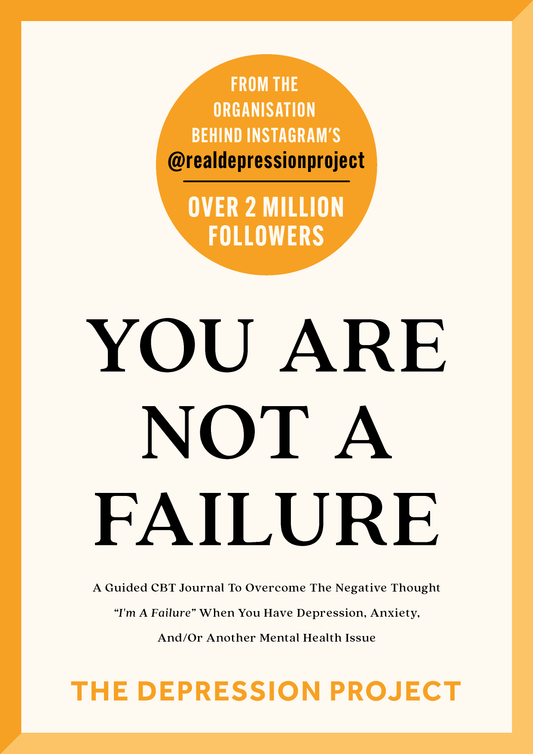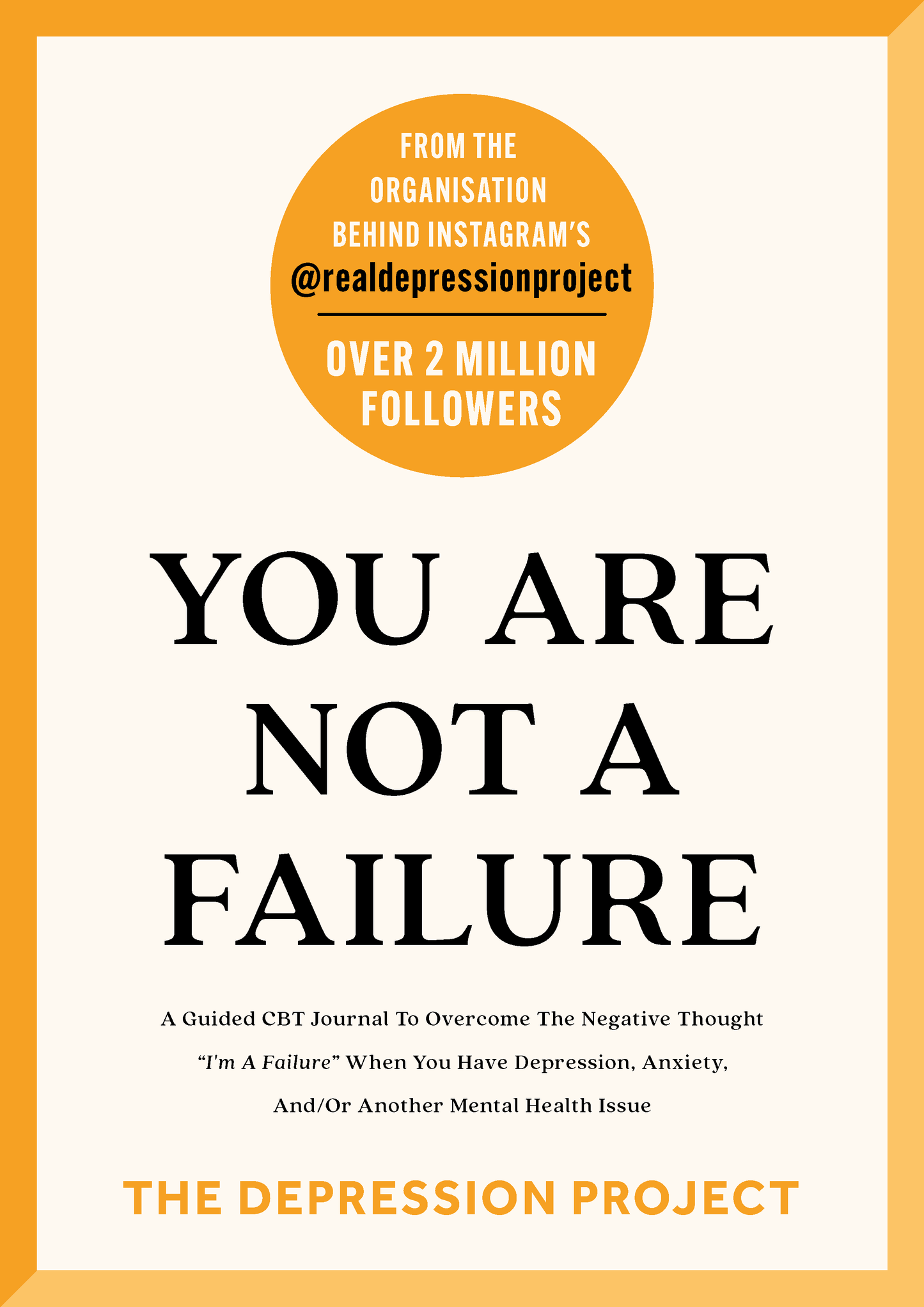
Do you ever experience the negative thought "I'm a failure"?
According to members of The Depression Project's 3,000,000+ person social media community, the negative thought "I'm a failure" is often triggered in many, many different situations, such as when:
- You compare yourself to other people who you feel are doing better than you;
- You don’t achieve a goal that you’d set out to achieve;
- You don’t feel as if you’re living up to certain expectations of yourself – either your own, or those of other people;
- You experience a disappointing setback;
- You are put down and criticised by other people;
- You struggle to do something that you feel you should be able to do (such as, for example, completing something at work, sticking to healthy habits, maintaining a clean home, and/or consistently attending to your personal hygiene).
And, not only is “I’m a failure” one of the most common negative thoughts that our community members reported experiencing due to the myriad of different ways that it can be triggered, but as you may be able to relate to yourself, it can also be one of the most deep-seated – to such an extent that it can be a firmly entrenched belief, and one you may’ve held about yourself for years or even decades.
For this reason, the notion that you can actually free yourself from the negative thought (or belief) “I’m a failure” may seem extremely difficult to fathom. However, “I’m a failure” really is just that – a negative thought (or a negative belief) – as opposed to a fact. And, for this reason, we’ve put together this cognitive behavioural therapy-based journal, in order to help you:
- See for yourself that this negative thought / belief is not true;
- Start viewing yourself in a much more positive, self-compassionate way, and feel more worthy as a result.
Here’s A Breakdown Of Exactly What This Journal Will Cover
PART 1: Cognitive Behavioural Therapy Techniques To Help You Overcome The Negative Thought “I’m A Failure" Anytime It Is Triggered
In the first part of this journal, we’ll share with you a wide variety of tried, tested, cognitive behavioural therapy techniques to help you overcome the negative thought “I’m a failure” anytime it is triggered by one of the factors that we mentioned above (i.e. negatively comparing yourself to other people, not achieving a goal, not feeling as if you're living up to certain expectations of yourself, experiencing a disappointing setback, being put down and criticised, and/or struggling to do something you think you should be able to do).
Additionally, each technique we share with you will also be accompanied by one or more guided journal prompts - in order to help you think about how you could implement that technique as effectively as possible.
PART 2: Is “I’m A Failure” A Deeply Entrenched Belief You Hold?
Like we’ve said, the negative thought “I’m a failure” is often one of the most deep-seated negative thoughts that people have – to such an extent that it can be a firmly entrenched belief, and one that you may’ve held about yourself for years or even decades. And, if this is the case, then while you will still likely find the CBT techniques and the accompanying journal exercises that we share in Part 1 with you helpful, it’s also almost certain that you’ll need to do some much deeper work in order to free yourself from what we’ll call the negative core belief “I’m a failure” (where by negative core belief, what we mean is a deep-seated, central belief you hold about yourself). Accordingly, this is the focus of Part 2 of this journal, where we will cover:
- The negative experience(s) that led to your negative core belief “I’m a failure” developing - which is something that is very important, because neither you nor anyone else is born with negative core beliefs about themselves like “I’m a failure”. Rather, they are developed over time – often during childhood – and arguably their most common starting point is one or more difficult, painful experiences – such as not achieving one or more goals that were extremely important to you, or constantly being put down and criticised, for example. Consequently, an important initial step in overcoming the negative core belief “I’m a failure” is to pinpoint any experiences in your life that it originated from, and to understand how it developed from there.
- Re-processing the negative experience(s) that led to you developing the negative core belief “I’m a failure” - Once we’ve helped you identify which negative experience(s) contributed to you developing the negative core belief “I’m a failure”, we’ll next share some powerful, cognitive behavioural therapy-based journal prompts with you - in order to help you view those negative experiences in much more positive, self-compassionate, accurate ways; and consequently start to let go of the negative core belief “I’m a failure” which is attached to the way you currently view those negative experiences.
PART 3: Changing The Way You “Self-Evaluate”
In addition to one or more difficult, painful past experiences like we cover in Part 2, another extremely common factor which can fuel the negative belief “I’m a failure” is the way in which you self-evaluate – in order to determine if, for example:
- You are doing “well” in life;
- Your life is “on the right track”.
In particular, if you struggle with the negative thought / core belief “I’m a failure”, then you can likely relate to self-evaluating in one or more of the following ways:
- Based on how you compare to other people – in the sense that if you feel you compare favourably to other people, then you tend to feel worthy, good about yourself, and think positive thoughts like “I’m doing well in life” and/or “my life is on the right track”. However, if you instead feel as if you compare poorly to other people, then you tend to feel worthless, bad about yourself, and think / believe “I’m a failure”.
- You may self-evaluate based on the feedback you receive from other people – in the sense that if you receive praise, compliments and other positive feedback, then you tend to feel worthy, good about yourself, and think positive thoughts like “I am capable” and/or “I can do a good job”. However, if you are put down, criticised or receive other kinds of negative feedback from people, then you tend to feel unworthy, bad about yourself, and think / believe “I’m a failure”.
- You may self-evaluate based on whether you are achieving (or are on track to achieving) your goals or not – in the sense that if you are achieving / are on track to achieving your goals, then you tend to feel worthy, good about yourself, and think positive thoughts like “I’m doing well” and/or “I’m successful”. However, if you are not achieving / are not on track to achieving your goals, then you instead tend to feel worthless, bad about yourself, and think / believe “I’m a failure”.
Consequently, in the third and final part of this journal, we’ll share with you a much healthier method of self-evaluation that can replace the three that we just mentioned - which can result in:
- The negative thought "I'm a failure" being triggered much, much less frequently than it otherwise would be;
- You feeling much better about yourself moving forwards, as well as more fulfilled and satisfied in your day-to-day life.
FAQ #1: Why should I be confident this journal will help me?
This journal is grounded in cognitive behavioural therapy - which in case you don't know, is a leading form of treatment for depression, anxiety, panic attacks, phobias, personality disorders, and a wide range of other mental health issues.
Additionally, this journal is also written with the warmth, care, encouragement and insight that, with 3,000,000+ followers on social media, The Depression Project has become renowned for :)
FAQ #2: What format does this journal come in?
This journal is available in two different formats for you to choose from:
- PDF - which you will be able to download instantly after purchase, and then print out at your home, office or local printer.
-
Paperback (if you live in the US or Canada) - which will be delivered to you within 4-8 business days. Shipping costs are US$7.95 within the US and CAD$14 within Canada. This shipping cost is a flat rate, so whether you order one journal, or multiple journals, the shipping cost will be the same (if you would like to, you'll find the option to add one or more other journals to your cart below so that you can save on shipping). Once your order has been shipped, you will be emailed a number so that you can track it.
FAQ #3: What if I give this journal a try but I don't like it?
We're extremely, extremely confident that you're going to find this journal immensely helpful. But, just in case you don't, the PDF version of this journal comes with a 60 Day, No-Questions-Asked, 100% Moneyback Guarantee!

If you have any questions about this journal, then please feel free to click here and contact us so that someone from our friendly team can answer them for you :)
Otherwise, we hope you choose to get this journal, because we know that you're going to find it really, really helpful!
All our love,
The Depression Project Team.
Format Options

